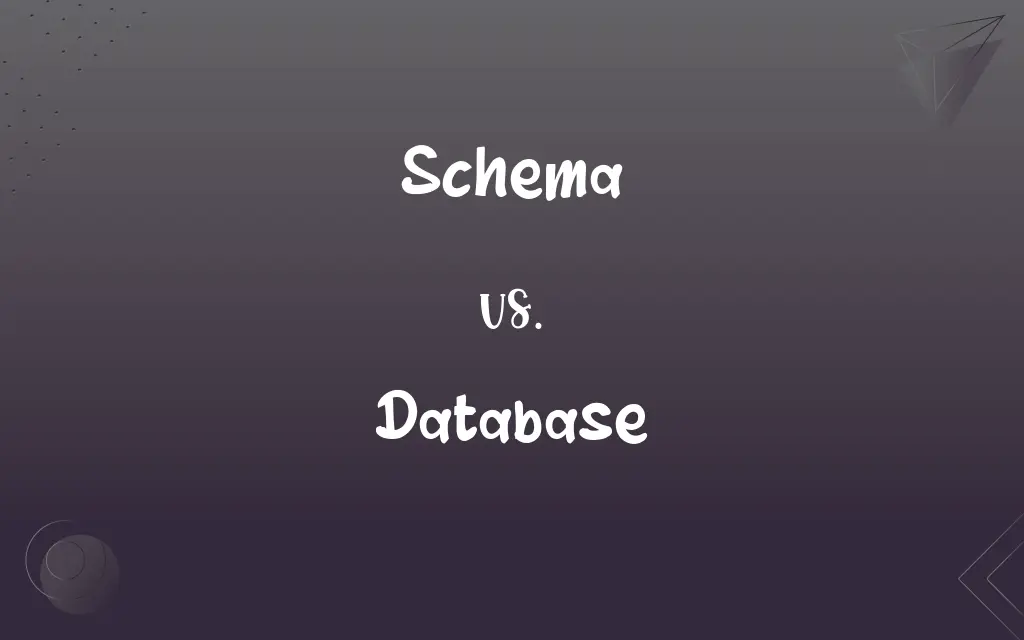Schema vs. Database: What's the Difference?
Edited by Aimie Carlson || By Harlon Moss || Published on August 7, 2024
A schema is a blueprint of the database structure, while a database is a collection of data stored in a structured format.

Key Differences
A schema in the context of databases refers to the formal description of the structure and organization of data, including tables, columns, relationships, and constraints. A database, on the other hand, is a collection of organized data that can be easily accessed, managed, and updated, and it exists as a functional entity that stores the actual data described by a schema.
The schema is about the layout and logical structure of the data within the database, such as how data is stored, linked, and processed, while the database itself is the physical storage of this data. The schema defines how the data is logically organized, while the database is where this data physically resides.
Schemas are important for designing and managing databases as they provide a graphical or textual representation of the database's structure. Databases, in contrast, are the actual platforms where data is stored and are dependent on the schema for their structure.
In database management, the schema acts as a blueprint that guides the organization of data in the database. The database, embodying the implementation of this blueprint, is used for storing and retrieving data as required by different applications.
The relationship between schema and database is integral; the schema cannot exist without a database to structure, and a database requires a schema to define its organization. Schemas are static in nature, defining the structure of data, whereas databases are dynamic, holding the actual, variable data.
ADVERTISEMENT
Comparison Chart
Definition
Blueprint of data structure and organization
Collection of organized data
Function
Defines tables, relationships, and constraints
Stores and manages actual data
Nature
Logical and structural
Physical and operational
Dependency
Schema depends on database design
Database functionality depends on schema structure
Change Frequency
Generally static; changes less frequently
Dynamic; data changes frequently
ADVERTISEMENT
Schema and Database Definitions
Schema
Schema refers to the set of rules and specifications used to define how data is organized in a database.
The schema defines the relationships between different data entities.
Database
A database is a systematic collection of data, electronically stored and accessed.
The company's customer information is stored in a secure database.
Schema
Schema in databases is used to categorize and structure the data types and their relationships.
The schema was crucial in maintaining data integrity during migration.
Database
Database refers to a digital system that stores and manages data in an organized manner.
They used a database to track inventory levels.
Schema
A schema is a logical framework representing the organizational structure of a database.
The database administrator updated the schema to include a new table.
Database
A database is an electronic archive for storing, managing, and manipulating data.
The database was updated with the latest transaction details.
Schema
A schema is a blueprint detailing the database’s architecture, including tables, columns, and relationships.
The software engineer referred to the schema while designing the query.
Database
In computing, a database is a structured set of data held in a computer or server.
The application retrieves user data from the online database.
Schema
A database schema is an abstract design that represents the storage of data in a database.
The new schema optimized the database for faster access.
Database
A database is a collection of information organized for rapid search and retrieval.
The library’s database contains records of all the books and journals.
Schema
A plan, outline, or model
A schema for prioritizing vaccinations.
A writer's schema for a novel.
Database
A collection of data arranged for ease and speed of search and retrieval. Also called data bank.
Database
To put (data) into a database.
Database
(general) A collection of (usually) organized information in a regular structure, usually but not necessarily in a machine-readable format accessible by a computer.
I have a database of all my contacts in my personal organizer.
Database
(computing) A set of tables and other objects (queries, reports, forms) in the form of a structured data set.
The "books" database will have three tables, and the "customers" database will have two tables.
Database
A software program (application) for storing, retrieving and manipulating such a structured data set.
Which database do you use: MySQL or Oracle?
Database
A combination of such data sets and the programs for using them.
Database
To enter data into a database.
Database
An organized body of related information.
Database
An organized body of related information
FAQs
Is the schema part of the database?
Yes, the schema is a part of the database, representing its logical structure.
What is a database?
A database is a collection of data stored and organized electronically.
Can a database function without a schema?
No, a schema is essential for defining the structure and organization of a database.
Who designs a database schema?
Database schemas are usually designed by database administrators or system architects.
What is a schema in a database?
A schema is a structural blueprint of how a database is organized.
Do all databases use the same type of schema?
No, schemas vary depending on the database model (e.g., relational, NoSQL) and specific requirements.
How often do schemas change compared to databases?
Schemas are relatively static and change less frequently, whereas databases are dynamic and change often.
Is it possible to modify a schema once a database is in use?
Yes, schemas can be modified, but such changes need careful management to avoid impacting the existing data.
How crucial is database security?
Database security is paramount, as it protects sensitive data from unauthorized access and breaches.
What is a relational database schema?
A relational database schema defines the structure and relationships of data in a relational database.
Can a database have multiple schemas?
Yes, a database can have multiple schemas to organize different types of data.
What types of data can be stored in a database?
A database can store various types of data, including text, numbers, dates, and binary data.
Can the same schema be used for different databases?
Yes, the same schema can be applied to different databases, though it may require adjustments.
How does a schema affect database performance?
A well-designed schema can significantly improve database performance and data integrity.
Are databases limited to specific types of software?
No, databases can be part of various software systems, depending on the requirements.
How is data integrity maintained in a database?
Data integrity is maintained through constraints and rules defined in the database schema.
Are database schemas visible to end-users?
Typically, end-users do not see the database schema directly; they interact with data through an application.
Can a database exist without any data?
Yes, a database can exist without data, but it will have no practical use until data is added.
What is the role of a database in data analytics?
In data analytics, databases play a crucial role in storing and providing access to data for analysis purposes.
Can databases be accessed remotely?
Yes, most modern databases are designed for remote access, often via the internet.
About Author
Written by
Harlon MossHarlon is a seasoned quality moderator and accomplished content writer for Difference Wiki. An alumnus of the prestigious University of California, he earned his degree in Computer Science. Leveraging his academic background, Harlon brings a meticulous and informed perspective to his work, ensuring content accuracy and excellence.
Edited by
Aimie CarlsonAimie Carlson, holding a master's degree in English literature, is a fervent English language enthusiast. She lends her writing talents to Difference Wiki, a prominent website that specializes in comparisons, offering readers insightful analyses that both captivate and inform.






































































